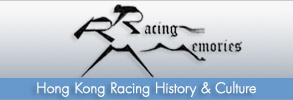-
HOMEARC Site Home
-
NEWSLatest Update
News
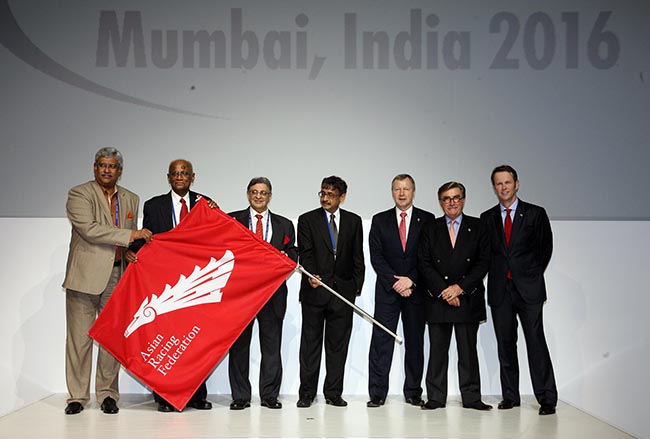
News Archives
-
TIMEAbout the Schedule
Key Dates

Look out for the important dates before the conference and be aware of the registration...
About the Schedule

Check the schedule of the 4 days conference, from day to night...
-
MULTIMEDIAPlay, View, Download
-
JOINRegister Accommodate
Register

How to register the conference? Check the details here and proceed with the registration...
Accommodation

Three selected hotels minutes to the conference venue. Check the details and room rate here...
Social Programme
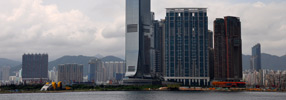
Social Programme available during the Conference period, including Opening and Closing Ceremony...
Tour Programme
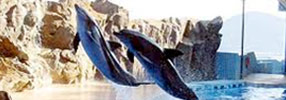
Three tours available for accompanying persons to discover the attractions of Hong Kong...
-
KNOWIntroducing the Hosts
About ARF & ARC
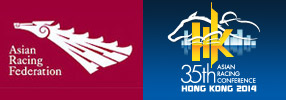
The Asian Racing Conferences are a global racing forum organized by the Asian Racing Federation (ARF)...
Milestones
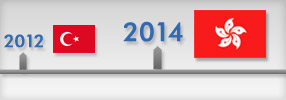
Racing in Asia has a long and rich history. Learn more about this history and the role played by the ARCs...
HKJC the host
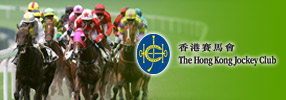
The Hong Kong Jockey Club is not only one of the world's leading horse racing organisations but also...
Discover Hong Kong

As Asia's world city, Hong Kong has much to offer to its visitors...
- EXHIBITION
Participate in Exhibition - EXHIBITION
News
Racing Authorities have the conviction to enforce stringent drug rules
06/05/2014
Mr Louis Romanet, Chairman of the International Federation of Horseracing Authorities (IFHA) reaffirmed his organisation's commitment to horse welfare and medication control today, May 6, at the session titled ‘Fair Competition and Drug Control’ at the 35th Asian Racing Conference in Hong Kong.
-
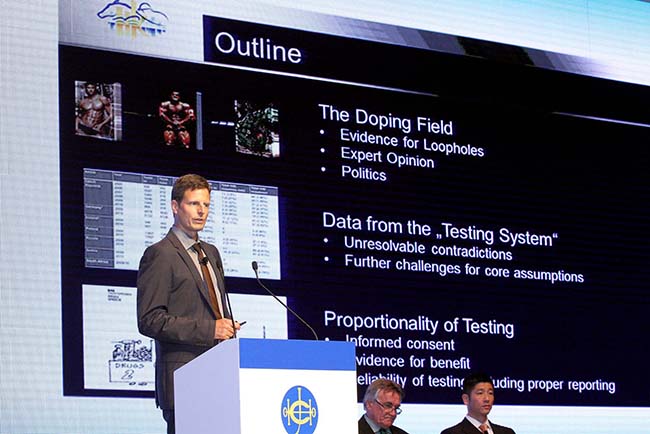 Dr Simon Perikles, Head of the Department of Sports Medicine, Rehabilitation and Disease Prevention of Johannes Gutenberg University, expresses his views and opinion on drug control to attending delegates.
Dr Simon Perikles, Head of the Department of Sports Medicine, Rehabilitation and Disease Prevention of Johannes Gutenberg University, expresses his views and opinion on drug control to attending delegates.
Romanet spoke of the IFHA’s commitment to both issues during the session, which also featured a presentation from world sports medicine expert Dr Perikles Simon, under the heading 'Leveling the Doping Field'.
"The IFHA must be proactive. The integrity of racing and horse welfare are absolute priorities,” Romanet said before detailing two significant elements of IFHA policy which he said had been universally endorsed.
"The first is agreement on control of medications including international screening limits and detection times. The second is a commitment to the detection of doping agents and prohibited practices in and out of competition. The IFHA supports a total ban on raceday medication and bans on anabolic agents throughout a horse's career," Romanet said.
Delegates heard that it is vital to the credibility of horse racing that everything is done to keep the sport ‘clean’ and retain the confidence of its participants, its fans and, crucially for racing’s finances, those who wager on horseracing - while noting that racing is far from the only sport facing this issue.
Dr Simon, from Johannes Gutenberg University in Germany, is a sports medicine and molecular biologist who is at the cutting edge of the fight against doping in sport. He was one of the original seven-member ‘Gene Doping’ group of experts within the World Anti-Doping Agency (WADA), charged with developing strategies for the prevention and detection of non-therapeutic use of gene protein in sport.
Dr Simon said that he was confident science could win the war against drugs provided other factors could be overcome. “While there may well be some drugs or combinations of drugs and methods of which the anti-doping community is unaware, the science now available is both robust and reliable. The real problems are human and political factors,” he said, noting that total revenue generated by elite sports dwarfed the amount spent on new detection procedures.
Presentations were also made by: Dr Yves Bonnaire, General Manager of the French Racing Laboratory, who gave an update on prohibited substances; Dr Seungho Ryu, International Racing Manager of the Korea Racing Authority, who outlined drug control in Korea; and Dr Paul Marie Gadot, Head of the Horses and Control Department of France Galop, whose subject was immunocastration and regularity of racing.
In a discussion which concluded this session. Mr James Gagliano, President and Chief Operating Officer of The Jockey Club was questioned about the situation in America, Mr Gagliano said: “Recent events have further galvanised our spirit to improve in all areas. The industry requires consumer confidence and trust and the welfare of the horse is a high priority,” he said.
News
- Hong Kong passes the flag to India as historic Asian Racing Conference closes with announcement of HKJC CEO as new Chairman of the Asian Racing Federation
- Racing and breeding in Mainland China discussed for the first time at an Asian Racing Conference
- High-profile speakers call for international cooperation to battle corruption in sport at Asian Racing Conference











